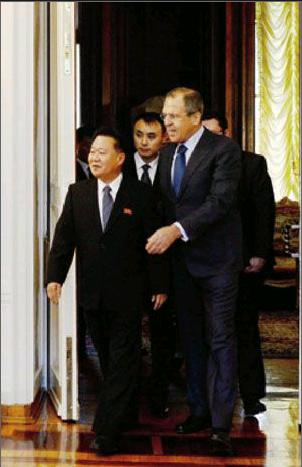The Korean Quandary
2015-01-12ByShiYongming
By+Shi+Yongming

Choe Ryong Hae, a close aide of Kim Jong Un, top leader of the Democratic Peoples Republic of Korea (DPRK)—also known as North Korea—visited Russia in November as a special envoy of Kim.
Choe, a member of the Presidium of the Political Bureau and Secretary of the Central Committee of the Workers Party of Korea, met with Russian President Vladimir Putin at the Kremlin and passed along a message from Kim. The two sides also committed to taking steps to raise the level of their political dialogue and finding ways to intensify economic and military cooperation. Most notably, the two sides also discussed how to restart the six-party talks on the Korean Peninsula nuclear issue and foster a favorable environment. Russian Foreign Minister Sergei Lavrov said that Pyongyang is preparing to restart the talks without preconditions.
Now, it is still difficult to judge whether the major objective of Choes Moscow trip was to discuss restarting the six-party talks or if Pyongyang just passively accepted Russias suggestion to engage in the talks for its own aims. In any case, the move shows that the settlement of the Korean Peninsula nuclear issue cannot bypass the talks.
Suspended dialogue
The six-party talks, starting in August 2003 in Beijing, involve North Korea, the United States, China, Russia, the Republic of Korea(ROK or South Korea) and Japan. Since North Korea pulled out of the talks in April 2009, the situation on the Korean Peninsula has come to a stiff deadlock. Pyongyang firmly upholds a strategy of developing nuclear weapons while pursuing economic growth. Thus, it is even more difficult for the country to give up its nuclear program.
That being the case, the United States has begun to intentionally ignore North Korea, as it is more concerned with the overall global situation. Although President Barack Obama announced shifting U.S. strategic focus to the Asia-Pacific region, turmoil in other part of the world, especially unrest in the Middle East, has distracted him from this objective. At the same time, the Obama administration is also facing numerous domestic troubles. Thus, there is no urgent need for it to invest efforts into the stubborn Korean Peninsula nuclear issue.
In addition, the U.S. pivot-to-Asia strategy also requires a military presence in the region. The protracted Korean Peninsula nuclear issue provides an excuse for the United States to strengthen its regional military might. It promotes the construction of a U.S.-Japan-ROK military alliance so as to have more leverage to confine the development of the China-South Korea strategic cooperative partnership.endprint
Under these circumstances, Pyongyang has tried and failed many times to find opportunities to talk bilaterally with Washington.
DPRK authorities have attempted to repeat the story of the 2002 North Korea-Japan summit that prompted the United States to engage in dialogue with them. But times have changed, and it would be impossible for Japanese Prime Minister Shinzo Abe to visit North Korea given U.S. opposition.
During the 17th Asian Games in Incheon, South Korea, three high-ranking North Korean officials made a surprise visit to the South on October 4 and held talks with ROK officials. The two sides agreed to meet again. In the end, however, Seouls tacit permission for the launch of anti-Pyongyang propaganda balloons has made Pyongyang abandon the opportunity to continue the dialogue, and unsurprisingly the country has turned to Moscow for help.
Increasing risks
Russia is attempting to play a larger role in Korean Peninsula affairs than it has since the end of the Cold War, when it became an outsider in the matter. Although Russia has been an important partner within the six-party talks, it was difficult for the country to step into the spotlight. But now, the nuclear deadlock has provided a historic opportunity for Russia to expand its involvement.
On the other hand, Russia has recently been sanctioned by the United States and the EU owning to the Ukrainian crisis, and risks being trapped in a “new” Cold War, Putin does not want U.S.-Russian relations to spin out of control. To find new opportunities and avoid head-on confrontation with the United States and the EU, Russia is also shifting its diplomatic focus to the east.
In recent years, Russia has pinned hopes on easing the tense situation on the Korean Peninsula through economic means. Economic links between Russia and North Korea have become closer recently. Pyongyangs recent move to embrace Moscow has provided the latter a fresh opportunity to assume the role as a mediator to restart the six-party talks.
However, although it will provide a chance for Russia to step up consultation together with the United States on international affairs, to fundamentally change the Korean Peninsula situation is no easy task.
The Korean Peninsula nuclear issue is not any easier to solve than the Ukrainian crisis. If we call tensions between Russia and the West over the Ukrainian crisis a “new” Cold War, then the“old” Cold War on the Korean Peninsula never ended.endprint
As Pyongyang and Seoul have always regarded each other as a threat and given that each holds the ambition to reunify the peninsula in their own way, it is indeed difficult for the two countries to achieve reconciliation or build mutual trust, not to mention that the United States has been seeking to dominate the Korean Peninsula affairs using the nuclear issue.
A new political battleground has now emerged on the Korean Peninsula along with the continuation of the nuclear deadlock. On November 18, the Third Committee of the 69th UN General Assembly passed a resolution, drafted by the EU and Japan, recommending the Security Council refer North Korea to the International Criminal Court for crimes against humanity. This decision has aroused a fierce reaction from North Korea with its refusal to accept any cooperation on human rights dialogue or nuclear talks.
In the meantime, South Korea is planning to deploy the U.S. THAAD anti-ballistic missile system, which will further stimulate Pyongyang to speed up its nuclear capability development recklessly. The developing situation is seemingly contributing to a prolonged confrontation on the Korean Peninsula. With the accumulation of risk factors for the Korean Peninsula nuclear issue, the odds of finding a resolution appear scarce.
An acceptable approach
The United States and some other countries have argued that if all countries isolate North Korea and impose heavy sanctions, the country will naturally give in. But actually, this idea is naive. In fact, if North Korea suffers more pressure from the outside, its internal coherence is very likely to grow.
In addition, if the sanctions further worsen the livelihood of the North Korean people, it will not only go against humanity but also violate the spirit of the UN Charter.
In reality, though the international sanc- tions on North Korea are increasing, the economic situation of the country is improving. This is related to both Pyongyangs economic reform as well as its investing more efforts in economic development.
At present, North Korea is trying to accumulate foreign exchanges through exporting natural resources and labor power, intending to build its own internal economic cycle. The market economy-like pragmatist measures that Pyongyang has adopted and the motivation to improve peoples livelihood have become an important impetus for boosting the domestic economy.
Surely, though North Koreas economy has largely improved, the country is still faced with various development challenges. The first thing to change its current lot is to open the door to the outside world. It is believed that this was the main purpose of Choes latest visit to Russia.
The current situation on the Korean Peninsula is extremely ominous for its future development. On the one hand, the increasing confrontations are eroding prospects for reconciliation; on the other, the economic sanctions against the DPRK had limited effects. Moreover, the economic improvement of North Korea also means a more stable regime with enhanced ability to fight back. Therefore, the risk of confrontation is gradually on the rise. It represents a“lose-lose” pattern. Thus, it is in the interests of all parties to create conditions to bring the Korean Peninsula nuclear issue back to the right track and solve it by way of dialogue.endprint
